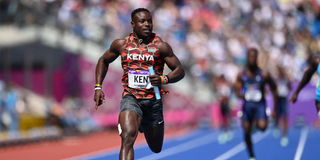AK tacticians must change tack to tackle tough Budapest qualifying standards

Kenya's Ferdinand Omanyala competes during the men's 4x100m relay round 1 athletics event at the Alexander Stadium, in Birmingham on day nine of the Commonwealth Games in Birmingham, central England, on August 6, 2022.
What you need to know:
- AK’s junior training camps - organised by Barnabas Korir and his team at the youth department in the build-up to the World Under-20 Championships in Cali, Colombia - should be replicated at senior level to ensure consistent, targeted training.
- With the challenging qualifying standards, it certainly shouldn’t be business as usual!
World Athletics have released qualifying standards for next year’s World Athletics Championships to be held at the National Athletics Centre in Budapest, Hungary, from August 19 to 21.
And with exactly 12 months to these championships, only a few Kenyans would qualify if they were to be held today owing to the rather high qualifying standards set by the global athletics governing body.
Already, some of Kenya’s top athletes and coaches have protested against these unusually high standards, with head coach Julius Kirwa afraid that Africa will struggle to qualify athletes for Budapest especially in the sprints.
A cursory glance at the approved standards justifies Kirwa’s concerns.
In the 100 metres, for instance, the qualifying time is 10.00 seconds for men and 11:08 for women, while in the 200m, the mark is 20.16 and 22.60 seconds for men and women, respectively.
Currently, Kenya has only Omanyala and Maximila Imali in the top 100 of the world rankings in both sprints with Omanyala having dipped inside the required standard this year in the 100m.
This means that his season’s best 20.45 in the 200m keeps him outside the qualifying standard, while Imali’s best times this year in the two sprints (11.19 and 23.10) also mean she is yet to qualify for Budapest.
In the 400m, there’s no Kenyan woman in the top 100 this season, while in the men’s section, Boniface Mweresa, who is ranked 70th, is the only man in the reckoning with his 44.96 seconds clocked at the recent Commonwealth Games in Birmingham, just inside the 45.00 qualifying mark.
Veronica Mutua ran her season’s best 52.42 at the national trials at Kasarani, but the mark falls outside the 51.00 qualifying standard.
The situation is equally worrying in the women’s 800m where only Commonwealth champion Mary Moraa qualifies for Budapest at present, having dipped under the 1:59.80 qualifying time five times this season, including a personal best 1:56.71 in winning bronze at the World Championships in Eugene.
Jarinter Mawia is within striking distance with 1:59.84 run in May at the Meeting International du SATC at the Stade Sesquieres in Toulouse, France, in May.
Naomi Korir and Vivian Chebet, Kenya’s two other athletes in the top 50 this season, are yet to dip under two minutes.
The men’s situation is way more promising with 10 athletes in the top 50 this season and capable of easily challenging the 1:44.70 qualifying mark, namely Emmanuel Korir, Emmanuel Wanyonyi, Wycliffe Kinyamal, Ferguson Rotich, Collins Kipruto, Noah Kibet, Michael Saruni, Cornelius Tuwei, Nicholas Kebenei and Festus Lagat.
While we have class in both the men’s and women’s 1,500m, the gap between Faith Chepng’etich – arguably the best women’s 1,500m runner of all time – and the rest of the field is worrying.
Faith’s national record 3:50.37, the world’s second fastest time ever recently run in Monaco, is miles ahead of other Kenyan women milers.
Edinah Jebitok, Winny Chebet, Judith Kiyeng, Hellen Ekarere, Brenda Chebet and young Purity Chepkirui are all in the top 50 but have some ground to cover.
Kenya has never had any qualification problem in the men’s and women’s 5,000m, 10,000m and the marathon, but with the rise of Ugandan athletics and, lately, Scotswoman Eilish McColgan’s rich vein in form leaves us with some thinking to do.
Interestingly, apart from Julius Yego who qualified for Budapest with a bronze medal javelin throw of 85.70 metres at the Commonwealth Games to beat the 85.20m standard, along with Alex Kiprotich also in the javelin and Mathew Sawe in the high jump, no other Kenyan man or woman is anywhere near qualifying in the jumps, throws and hurdles!
Kiprotich finished eighth in the javelin competition in Birmingham with a throw of 77.93 and, if he recovers fast from his injury, has potential to dig deeper.
Sawe has jumped sparingly this season with his best performance, 2.24m, coming in May in France and still off the 2.32 qualifying standard.
Moral of the story is that the Athletics Kenya (AK) coaching and technical departments must regroup and change tack because good performance in Budapest next year will lay the foundation for a successful outing at the 2024 Paris Olympics.
Athletes within striking distance of the qualifying standards must be afforded opportunities by AK to travel for competitions within the qualifying period, and this shouldn’t be left to agents alone.
A busier domestic circuit too is needed and AK should consider reviving the relays series that was well sponsored by Safaricom some seasons back.
County government and corporate involvement in financing the weekend meetings will make them more lively and competitive as long as technical officials in charge ensure the times and distances are recognised by World Athletics, which should involve more interaction with legend Ibrahim Hussein, World Athletics’ director of the Nairobi-based Regional Development Centre, for technical insights.
Athletes should also be granted unfettered access to quality training venues which, sadly, are few and far between in Kenya.
AK’s junior training camps - organised by Barnabas Korir and his team at the youth department in the build-up to the World Under-20 Championships in Cali, Colombia - should be replicated at senior level to ensure consistent, targeted training.
With the challenging qualifying standards, it certainly shouldn’t be business as usual!




